How 2 Egyptian Entrepreneurs are Building Incredible Houses Out of Abandoned Shipping Containers
Using cargotecture - container architecture - Karim Rafla and Youssef Farag are upcycling discarded shipping containers which would otherwise be left to rot, to create everything from houses to restaurants, to possible governmental projects.
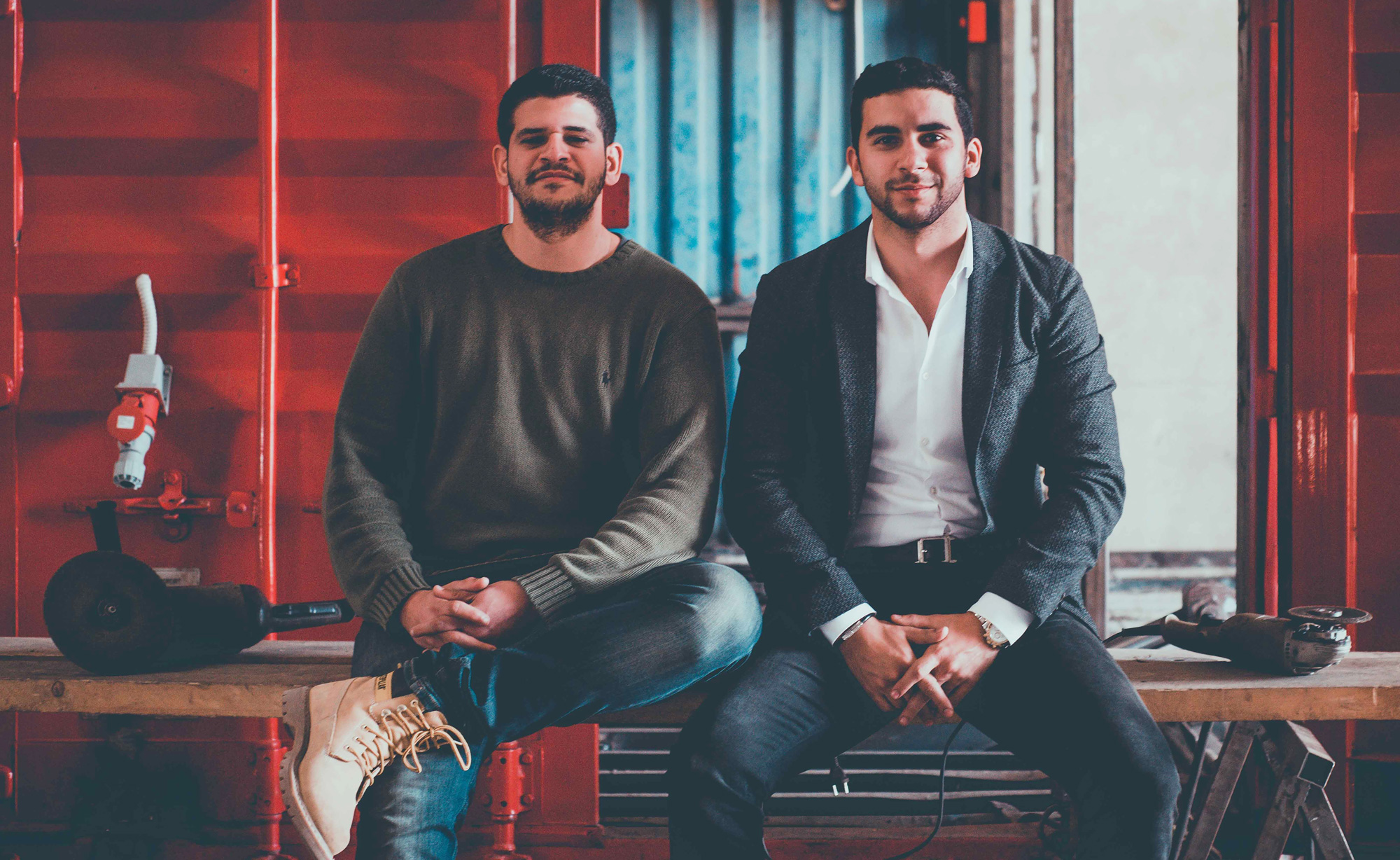
“Architecture should speak for its time and place,” Frank Gehry once said. Ours is a time of excess, opulence, a time of more is more; where countries are vying for the privilege of building the tallest tower in the world, the most luxurious hotel in the world, of submerging rooms, entire homes, under water. Just because. Inversely, it’s also a time where some realise the absurdity of this constant insatiable quest for more and instead of pushing to make more, push to reimagine what we already have.
Egyptian startup Qubix, founded by Youssef Farag and Karim Rafla, focuses on cargotecture; an amalgamation of cargo and architecture, the modern day mode of construction upcycles used shipping containers and uses them as the basis for structures – anything from homes to restaurants.
“Containers are thrown out once they’re past their shipping life,” explains Yousef Farag, co-founder of the company. Qubix repurposes those discarded containers to give them second life. The concept is not a new one – it was patented as far back as 1987 in the United States – but it one which has gone largely unutilised in the Arab world, Egypt in particular. Which is precisely why the two entrepreneurs initially started capitalising on it.

While coming up with a thesis model for his business project in London, Rafla came across the concept of cargotecture. “I found a place in London that was a city made entirely out of containers, restaurants, homes, shops, everything. So I said ‘why don’t we have this in Egypt?’” he recounts.
He moved back to Egypt, teamed up with his best friend Farag, and the two – neither of whom had a background in architecture or engineering as they had studied business and finance respectively – began to brainstorm how they could make this sustainable form of architecture a reality in their homeland. The duo brought on Fatma Moemen as their head architect and designer, and got to work. “It was literally a backyard startup,” Rafla says. “We bought our first 20-foot container, put it in Yousef's garden, and just started experimenting.”
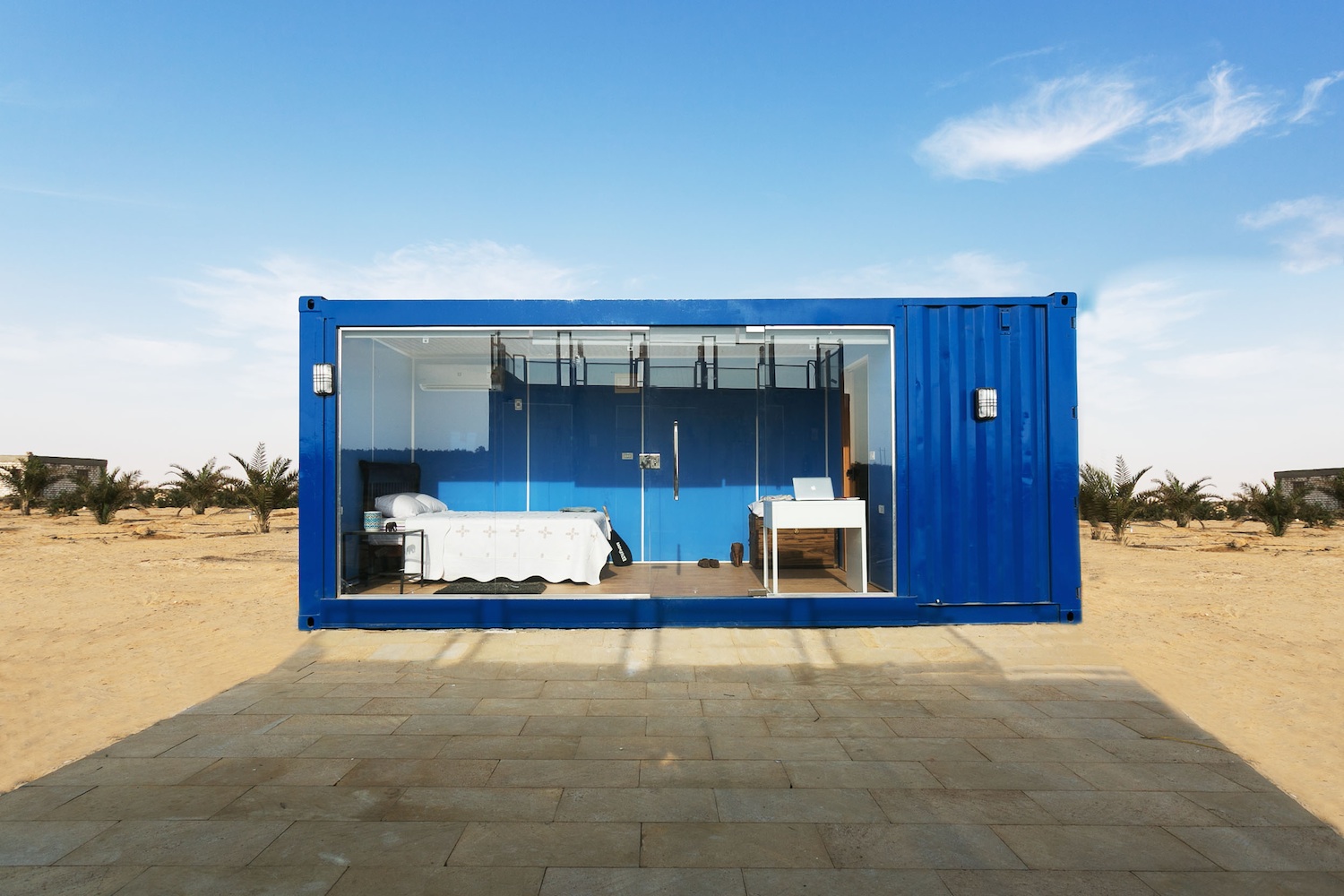 A private home Qubix built in Beni Suef.
A private home Qubix built in Beni Suef.
They began working on their prototype in March 2016 and by August, had their first order. In six short months, the duo have already delivered a fully functional home in Beni Suef, a BeFit training facility in Maadi, and are currently working on a restaurant. The inherent success of the concept of cargotecture hinges on the sheer practicality of it. “It’s environmentally friendly, it’s cost-efficient, it’s sustainable, it’s faster to build, it’s stronger as a structure, and it’s adaptable to any industry,” Rafla explains of the innocuously ingenious shipping container. “It’s such a brilliant idea; it’s one of those things that don’t exist in Egypt and you’re lucky enough to be the pioneer of it.”
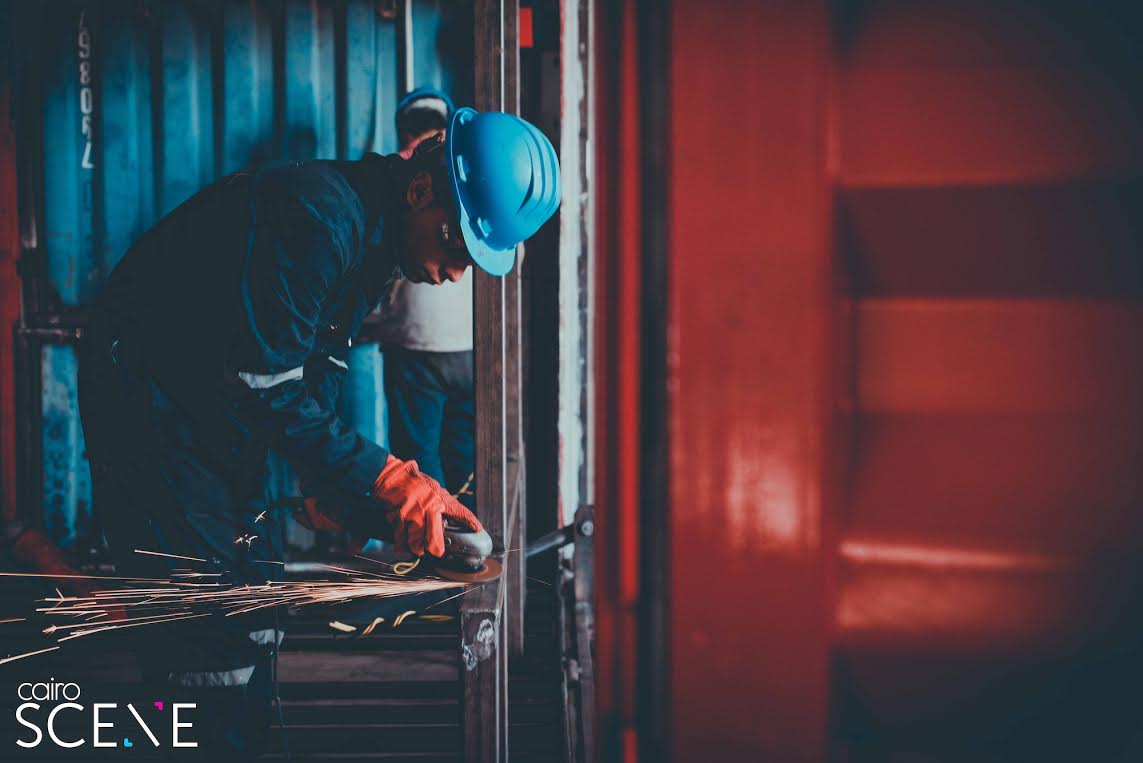
By mere virtue of reusing the existing instead of creating from scratch, thousands of kilograms of steel are saved, as is cost – “when you compare it to traditional brick and mortar buildings, containers are made up of much cheaper materials,” Farag explains. There also arises a strange duality when it comes to cargotecture; the structures are by nature built to be strong and as such function as resilient buildings; at the same time, they are easily movable and are vastly versatile in nature. The modular structures only come in two sizes - 20 feet and 40 feet - but by default of their design, they are created to interlock, which makes their possibilities endless.
“A container is a very versatile thing. They’re like legos,” Farag says, “You can place them side by side and open them onto each other; you can stack them on top of each other; you can keep the sides closed or have them roll down with hydraulics systems.” But they require no foundations – which makes them far easier to build than actual buildings – not just physically. “Usually when you’re building on land you have to follow a quota dictating what percentage of the land you can build on,” Rafla elaborates, “You have to make a foundation and those are more costs. Containers however, are classified as light structures, and they don’t count in that quota, so you can build as many as you want without needing a building permit.” Their lack of roots also makes them movable – but their movability does not translate to weakness. “Contrary to what people might think, containers are much stronger than a normal home,” Farag clarifies, “Like if you get a hammer and bang on the wall at home, it will break; if you do that on a container, it will just make a loud noise.”
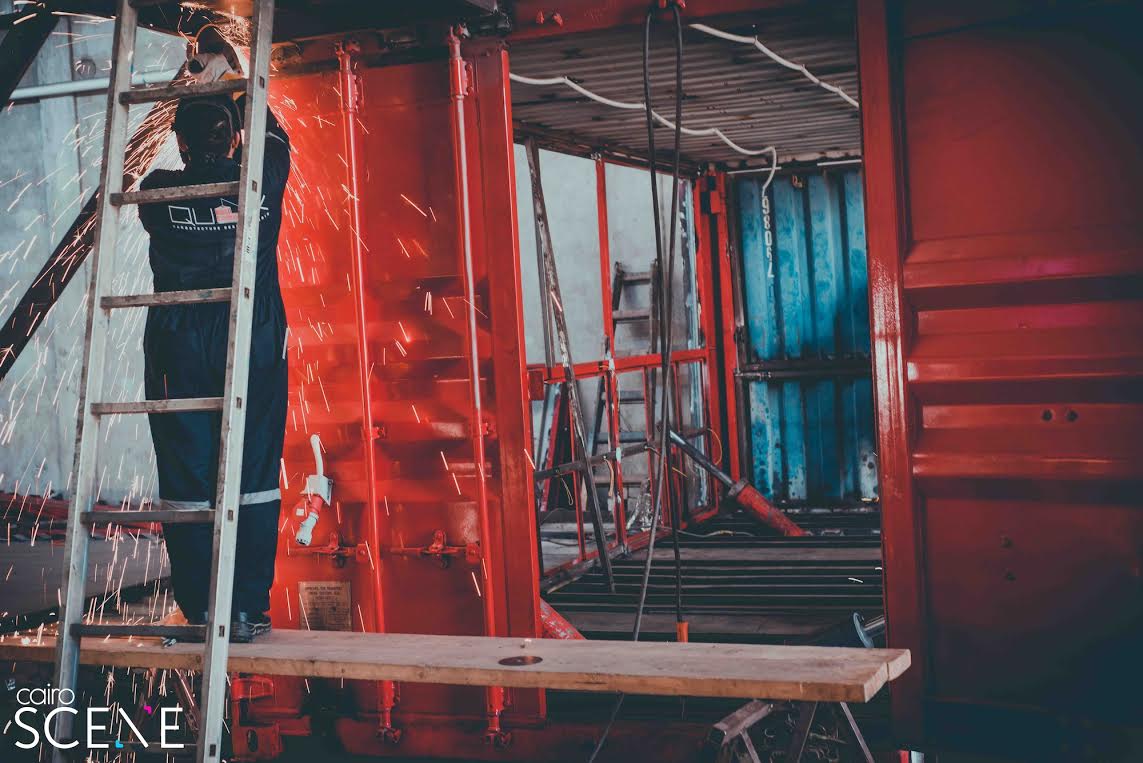
If you get a hammer and bang on the wall at home, it will break; if you do that on a container, it will just make a loud noise.
Companies sell containers once they’re past their shipping life. Qubix assess the leftover metal boxes for structural integrity and to ensure no chemical usage. “We have to make sure there’s nothing hazardous, nothing chemical that could harm user in the future,” explains Rafla, “We usually look for containers that were used for textiles or machinery.” After the containers pass inspection, it’s fair game.
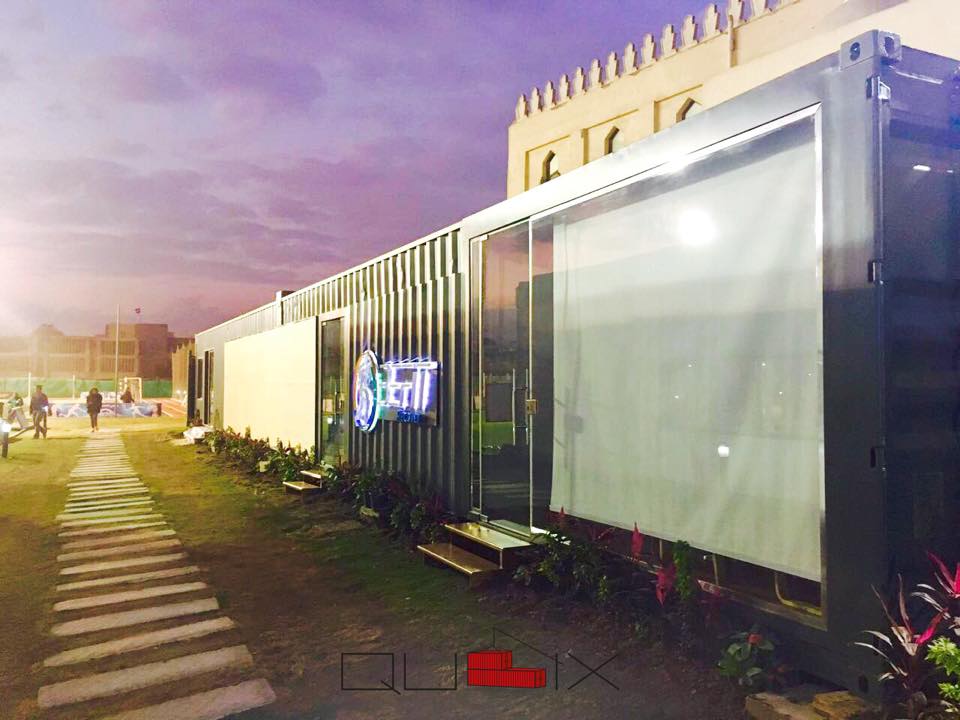 A BeFit training facility Qubix built for the fitness entity's Maadi branch.
A BeFit training facility Qubix built for the fitness entity's Maadi branch.
The innate malleability of the structures makes them ideal for a myriad of things, and the founders envision them playing a greater role in Egypt – from startups to low income housing. “Cargotecture is very promising because it offers limitless possibilities,” emphasizes head designer Fatma Moemen, “I see this becoming very successful in the future. It would open up a lot of possibilities for Egypt, especially for people with startups; for instance for people our age who want to have their own business or company, this would be perfect for them because it’s cost efficient.”
 Head Designer Fatma Moemen envisions that cargotecture will facilitate the entrepreneurship culture in Egypt.
Head Designer Fatma Moemen envisions that cargotecture will facilitate the entrepreneurship culture in Egypt.
Purchasing a fully functional (it’s a prefabricated good, entirely created at Qubix warehouses, eliminating the need for any kind of construction site) upcycled container may cost fraction of what it would to buy a physical space or even rent a piece of real estate and then transform it into a usable space, but essentially, any owner would still need to obtain the land or space on which to place it. Because Qubix aims to ease the process of setting up a space for entrepreneurs with limited funding, the company is currently working on an all-encompassing package that eases the external factors. “We’re currently working on putting together a package by Qubix for entrepreneurs; this package partners us up with several companies in different business spaces that will all serve our client, which would include taxes and rental space offered in numerous retail areas,” Farag explains.
Cargotecture is a fast, affordable, and long term solution for a problem Egypt has been trying to solve for almost 50 years now.
The usability of shipping containers transcends the spectrum from the most high end, to the most low end, and that is their underlying strength, and also, a core aim for Qubix. While you could build a lavish tripped out home out of fifty containers, or an edgy concept restaurant, the two founders have high hopes that the implementation of cargotecture in Egypt could potentially ease the way for low-income housing or projects. The issue of urban development has long plagued Egypt but cargotecture might prove to be an innovative solution. “Urban development and low-income projects are genuinely one of our main goals with this company,” Farag says, “It's a fast, affordable, and long term solution for a problem we have been trying to solve for almost 50 years now, if not more. You can genuinely build a whole community using cargotecture; schools, clinics, homes. They are safe and if the idea is implemented this will show the world that Egypt is innovating; it is moving forward with a relatively young idea in the world.”
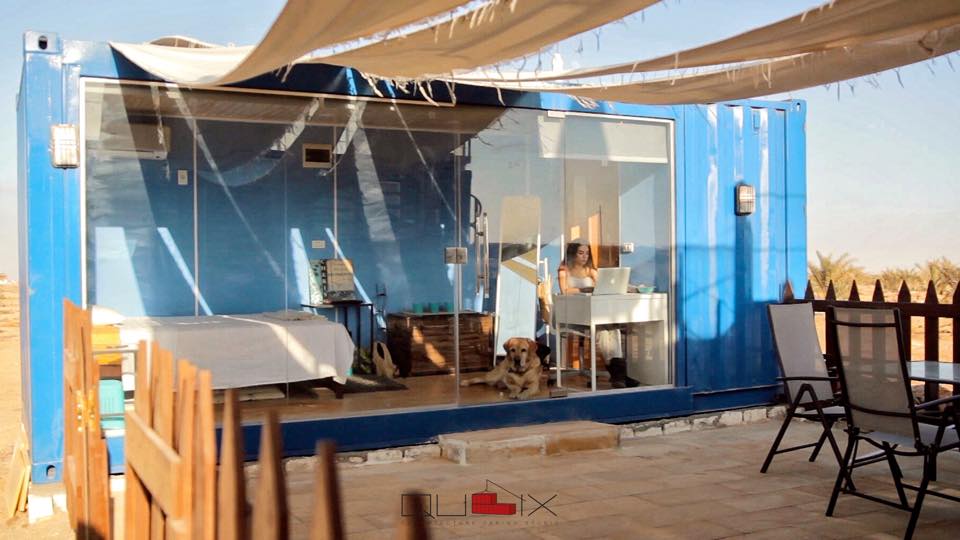 A closer look at the Beni Suef home.
A closer look at the Beni Suef home.
With three private projects under their belt already, several more in the works, including one particularly massive (and secret) undertaking on the horizon, Qubix are also simultaneously working on getting accredited by the Egypt Green Building Council and are gearing up to speak at an event organised by a consultancy firm which will discuss urban development with private and public sector individuals to reach innovative solutions. Their idea could prove equal parts edgy retail option and innovative urban development solution, oddly but easily fitting into both spheres.
“We don’t market ourselves as a brand, we market ourselves as solution. This is just a different way of doing something that’s always been done; building,” Farag concludes simply.

Shoot by @MO4Network's #MO4Productions
Photography by Kareem Ghazaly
Cinematography by Frederico Corno and Mahmoud Sameh.
Trending This Week
-
Mar 09, 2025































